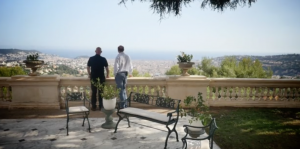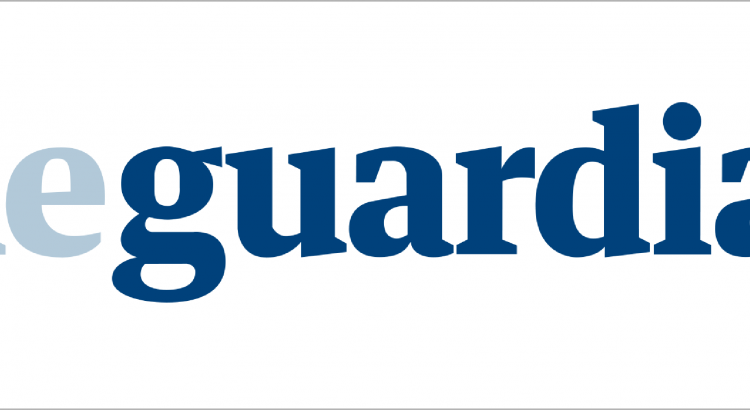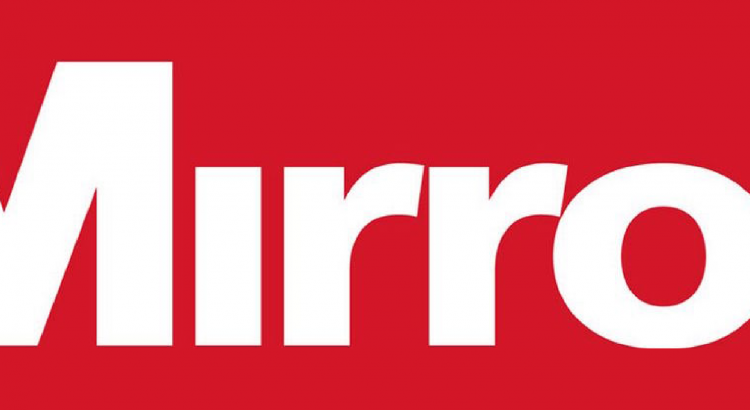Sergei Pugachev gives first interview since fleeing Britain about alleged death threats, being on the run and the man he helped get elected.
By Luke Harding in Nice
Sergei Pugachev doesn’t look like a man on the run. He is in good humour, dressed in jeans and a casual shirt. But the former Russian banker – once close to Vladimir Putin, and now his bitter opponent – is elusive about how he recently escaped from London to France.
“I can’t go into details. I didn’t swim the English channel,” he says, speaking from his new location in Nice on the Côte D’Azur. “It was all absolutely legal,” he adds.
Pugachev is embroiled in a battle with the Russian state, in which he was once a privileged insider. In 2011, he left Russia and settled largely in London, with his British partner Alexandra Tolstoy and their three small children.
His exit from Moscow came after a gradual cooling in his relationship with Russia’s president and, as Pugachev tells it, an astonishing raid by the Russian government on his $15bn (£9.6bn) business empire.
Once known as “Putin’s banker”, Pugachev owned two major shipyards, the world’s biggest mine and significant real estate in Moscow and St Petersburg. Pugachev says all this was taken from him – the asset grab similar to those suffered by other Russian entrepreneurs, the difference being its brazen scale.
The Kremlin, however, says Pugachev is a crook. It alleges that he siphoned off hundreds of millions of dollars from loans given by Russia’s central bank at the height of the 2008 financial crisis to Mezhprombank – co-founded by Pugachev in the 90s. It is now pursuing him vigorously in the London courts.
Pugachev calls the accusation “absurd”. “The state steals something then has to defend its theft. In my case the scale is huge, but in other respects this is a normal contemporary practice in Russia,” he says.
Last summer, Russia’s state deposit insurance agency, the DIA, won a freezing order in the UK high court against Pugachev’s worldwide assets. A judge ordered him to relinquish his Russian and French passports and to stay in Britain, pending further inquiries.
Pugachev says he’s now broke, at least by his standards. “I’m down to my last $70m.” Until recently, he was defending himself in court on the grounds he was too hard-up to afford lawyers.
Last month, he dramatically defied the court and slipped out of the country. His passports had been impounded, but somehow he escaped to Paris and then the south of France. Pugachev says he fled the UK for good reason: someone is trying to kill him.
“I’ve been receiving death threats since 2011. I could either obey the order and risk the lives of my wife and children or leave,” he says. According to Pugachev, the DIA’s deputy general director, Valery Miroshnikov, has said his problems in Russia would disappear in exchange for $300m. Otherwise, he or his loved ones would suffer “physical harm”. The claim, made in court, is denied by the DIA’s lawyers.
In May, Pugachev’s security team found suspicious devices planted under his and his family’s cars in London. Scotland Yard’s SO15 anti-terrorism unit took them away. “My conclusion is they are some kind of explosives,” Pugachev says. His lawyers suggest they are tracking devices, planted by the DIA, in the latest piece of intrusive surveillance.
Scotland Yard refused to comment on the alleged bomb plot. “We can’t say anything,” a spokesman said. The DIA’s British lawyers say it is a fantasy – a “tall story” made up by Pugachev to justify his “contempt of court”. Pugachev rejects this. He points to the dismal fate of other Putin critics in Britain, including Alexander Litvinenko and Boris Berezovsky, both of whom wound up dead.
We meet in a five-star art deco hotel overlooking Nice’s beach and sinuous urban promenade. This is his first interview since he fled. Nearby, tourists sunbathe around a frothy hotel pool; from the terrace there is a view of the Mediterranean, a sparkling turquoise; private jets clutter the city airport. The weather is balmy.
As exiles go, this is agreeable. Pugachev says he’s been a French citizen since 2009 and has lived in France on and off for 20 years. Moreover, he’s still cooperating with the UK court, he says, while launching his own legal case in Paris against the Russian government.
He adds that he intends to go back to London – where his children attend school – as soon as his legal issues are cleared up. Currently his family are with him in France.
Now 52, Pugachev was once an adviser to former Russian president Boris Yeltsin. In 1996, he ran Yeltsin’s re-election campaign. This was, he says, Russia’s last free election. He knew Anatoly Sobchak, St Petersburg’s mayor and a “brilliant figure”. He also became close to one of the mayor’s little known aides, Vladimir Putin.
Three years later, with Yeltsin ailing, Pugachev says he was part of a tiny group – including Yeltsin’s daughter Tatiana and her future husband, Valentin Yumashev, a Kremlin adviser – who selected Putin to be Yeltsin’s successor. This turned out, he acknowledges, to be a “tragedy for Russia”.
Pugachev co-ran Putin’s successful election campaign and at first was one of his closest companions. “We saw each other every day until late in the night, until 3 or 4am. We discussed state business,” he recalls. Was he the president’s friend? “Putin is a very closed person,” he answers carefully.
Pugachev took Putin round his presidential residence, Novo-Ogaryovo, situated in pine-scented woods outside Moscow. Putin was enthralled, Pugachev says, and liked his new 50-metre swimming pool. “He didn’t expect to be president. He hadn’t had any privileges. It all happened spontaneously.”
What’s Putin really like? Pugachev says two decades as a KGB spy, including time in communist east Germany, inexorably shaped him
“Everything in his consciousness flows from the Soviet Union,” says Pugachev. “He’s of this epoch. He saw Brezhnev and the politburo. Like any simple person he formed his opinions from watching Soviet TV.”
He adds: “Putin was never a politician. He is still not a politician. Discussions don’t interest him. Rather he is someone with complexes.”
Putin embarked on the job of running Russia with no plan or strategic vision, Pugachev claims. “I don’t think he’s an evil genius who wanted to set up the criminal regime that exists today. He surrounded himself with like-minded people whom he didn’t know very well and who had served with him in the KGB. They immediately began enriching themselves.”
According to Pugachev, Putin told him he only planned to stay in power for three or four years. “Putin wanted to get rich, too. He was a pragmatic person. We talked about this. He didn’t want to leave office poor.” By the end of his first presidential stint he was afraid of what might happen if he exited the Kremlin. His inner circle persuaded him to stay on.
That was more than a decade ago. How much money has Putin got now? “Everything that belongs to the territory of the Russian Federation Putin considers to be his. Everything – Gazprom, Rosneft, private companies. Any attempt to calculate it won’t succeed. He’s the richest person in the world until he leaves power.”
Like Brezhnev or Stalin, Pugachev believes that Putin will stay in office for life: “I don’t see any guarantees for him [if he steps down]. Putin doesn’t see them either.”
Pugachev spent 10 years at the top of Russian politics, both as a senator for the republic of Tuva and as the head of aerospace company OPK, one of Russia’s biggest corporations. He had an office in the Kremlin. He says he worked closely with Putin until 2006 or 2007, when they began to drift apart and saw each other less frequently.
Why the split? “We never had the same ideological outlook,” he says. Pugachev adds that he remained independent at a point when Putin expected everyone to kowtow to him. “Putin changed radically. He had his own team, apparatus. I didn’t see any perspective for myself, in politics or business, so I left.”
Since the Ukraine crisis, relations between Russia and the west have sharply deteriorated. Pugachev says that after returning to the Kremlin for a third term in 2012 Putin had a stark choice: to liberalise the country or to engineer something that would distract hard-pressed citizens from their economic woes.
Putin picked the latter. The distraction was his annexation of Crimea and covert invasion of eastern Ukraine, which fed into a deep-seated sense of patriotism. Ukraine was, Pugachev, says “a big mistake”. “Putin isn’t a strategist. He listens to the politburo that surrounds him, made up of KGB people. They are very aggressive.”
At the same time, Pugachev says, the west has repeatedly misread Putin, believing that granting him concessions might help. “Every compromise he sees as a personal victory,” Pugachev observes. The president often makes up policy on the hoof, a habit which leaves those around him trying to second-guess his intentions, and which leads to “catastrophically uncoordinated politics”.
In exile, Pugachev takes good care of his security; a bodyguard loiters unobtrusively nearby. The tycoon goes and has a cigarette on the terrace overlooking the sea. He’s mindful of what has happened to others, including the opposition politician Boris Nemtsov, “a close friend” who used to be his Moscow neighbour. Nemtsov was murdered in February. Who killed him?
“We don’t know. Putin is at the top of the state. He takes responsibility for everything that happens in the state. When an opposition politician is killed 100 metres from the Kremlin the question who killed him is a technical one,” Pugachev says. He adds: “The FSB had Nemtsov under 24-hour surveillance. He was very outspoken.”
And what about Litvinenko? Just down the road from the Rolls Building in London – where Pugachev’s commercial case is being heard – a public inquiry has been given details of how two Moscow assassins poisoned Litvinenko with radioactive polonium-210. One of them, Andrei Lugovoi, is now a prominent deputy in Russia’s Duma. “Putin responds to suggestions,” Pugachev says. “It was decided that Litvinenko was a traitor who had to be punished, so it wouldn’t happen again.”
In several hours of conversation Pugachev acknowledges just one mistake. He says that he played a part in using undemocratic methods to get Putin into power, believing this would be the best way of securing democracy post-Yeltsin. He now concedes it would have been better to have left it up to the voters.
“We have lost all the things we had with Yeltsin. It’s a great tragedy for Russia and it’s people.”
Source…







